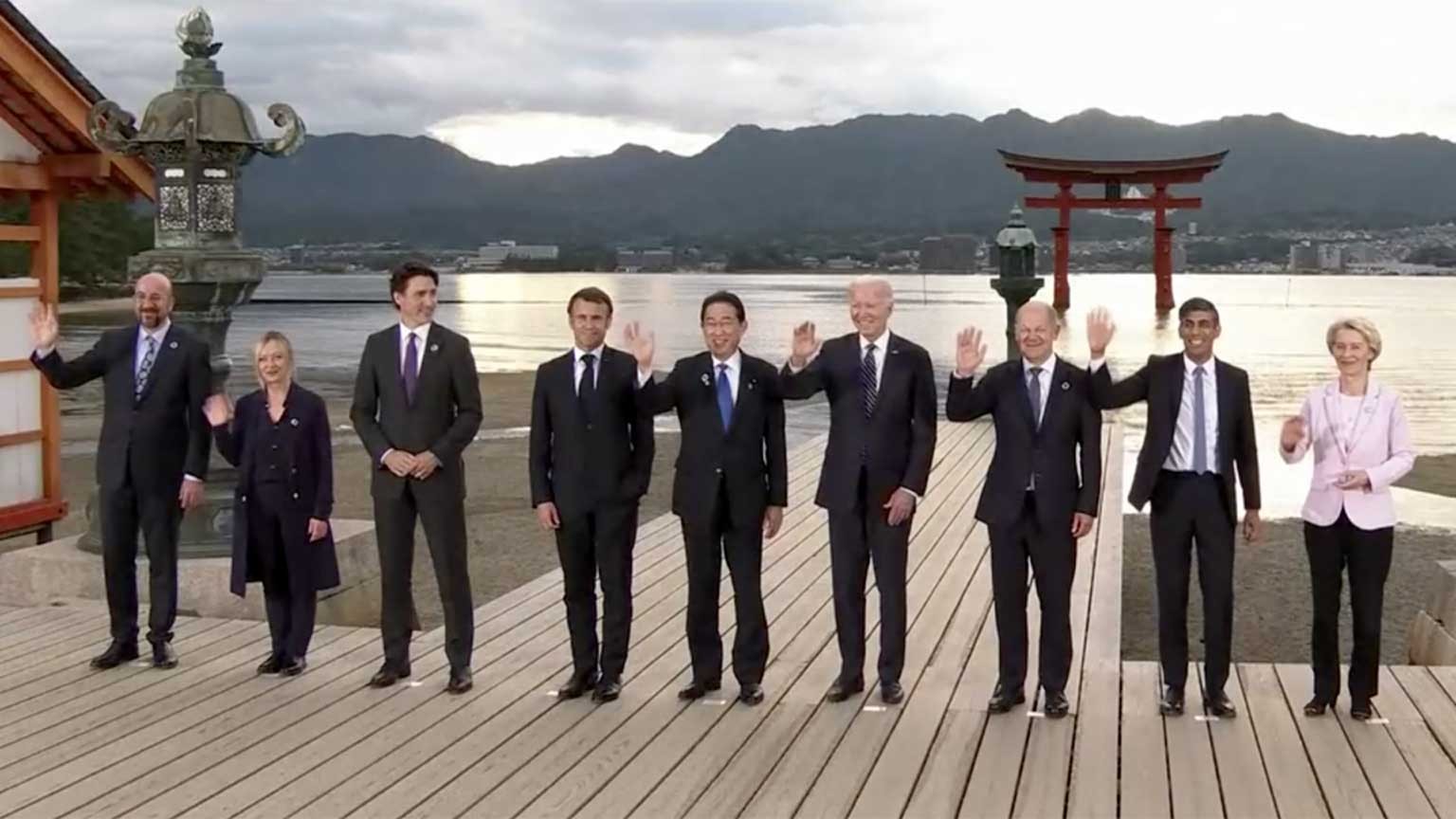They traveled to Miyajima Island, just outside of Hiroshima City on Friday evening. The island is home to the World Heritage Site Itsukushima Shrine.
After touring the shrine and posing for photographs, the leaders held a working dinner on the island. The theme was "diplomacy and security." The discussion likely focused on the security situation in the Indo-Pacific region, including China, as well as the challenges of nuclear disarmament and non-proliferation.
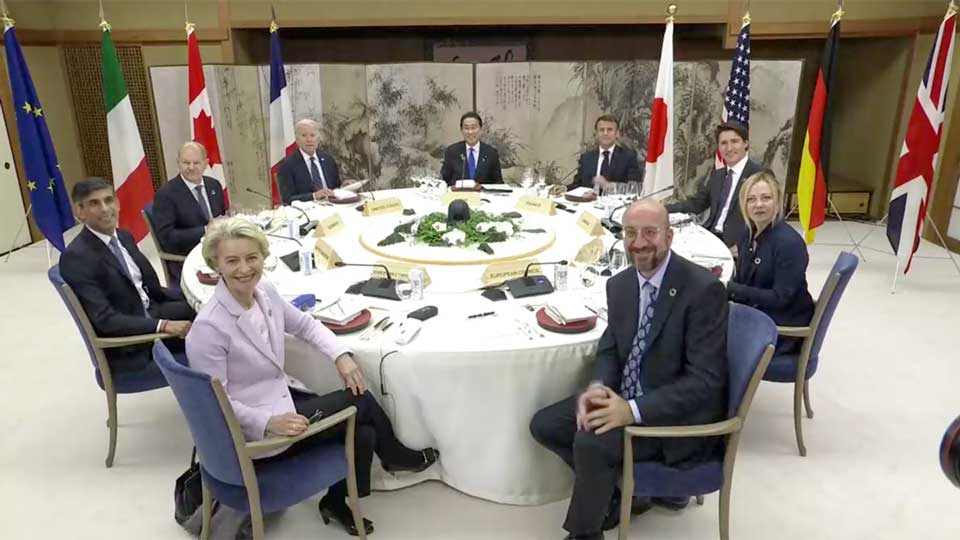
G7 leaders have discussed Ukraine issue
The leaders of the Group of Seven nations have released a statement on Ukraine as they wrap up their session on the issue.
It says, "We the Leaders of the G7, reaffirmed our commitment to stand together against Russia's illegal, unjustifiable, and unprovoked war of aggression against Ukraine." It says the leaders "condemn, in the strongest terms, Russia's manifest violation of the UN Charter."
As for sanctions against Russia, the leaders say they will further limit Russia's access to G7 economies. They say "we will broaden our actions to ensure that exports of all items critical to Russia's aggression including those used by Russia on the battlefield are restricted across all our jurisdictions."
Ukraine president Zelenskyy to visit Japan
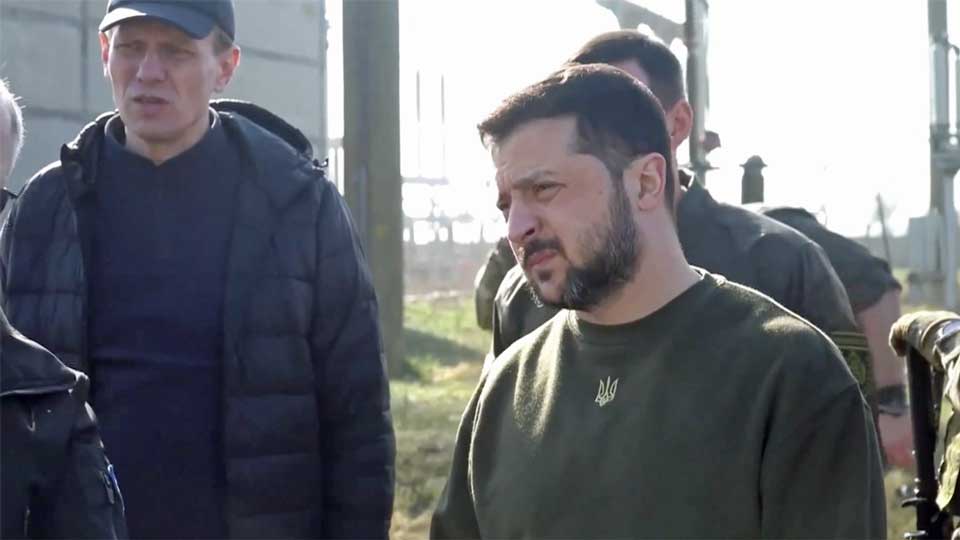
A Ukrainian official has told local media that President Volodymyr Zelenskyy plans to visit Japan to attend the G7 summit.
Zelenskyy was scheduled to join the summit online on Sunday, the final day. If his visit is realized, it will be his first trip to Asia since the start of Russia's invasion of Ukraine in February 2022.
Among the 10 scheduled sessions during the 3-day summit, dealing with the war in Ukraine is a top agenda item.
Discussion on global economy over lunch
Other topics the leaders discussed on the first day included the global economy and the use of AI. The leaders are believed to have discussed the use and regulation of generative AI tools amid the rapid spread of the technology.
The results of their three-day discussion will be compiled and issued as G7 summit's declaration that will be announced on the final day of Sunday.
The agenda for the Hiroshima summit will include; the situation in the Indo-Pacific, including China's moves in the region; and the impact of soaring prices on the global economy. The G7 Leaders' Statement will include other documents as well.
Japan's Prime Minister Kishida Fumio wants to send a strong message from the atomic-bombed city of Hiroshima. He will likely call for more efforts to abolish nuclear weapons.
The Japanese government is considering issuing an outcome document on nuclear disarmament and non-proliferation.
Leaders gather at Peace Memorial Park
Prime Minister Kishida Fumio, who is chairing the G7 gathering, welcomed the leaders taking part at Hiroshima's Peace Memorial Park with his wife Yuko.
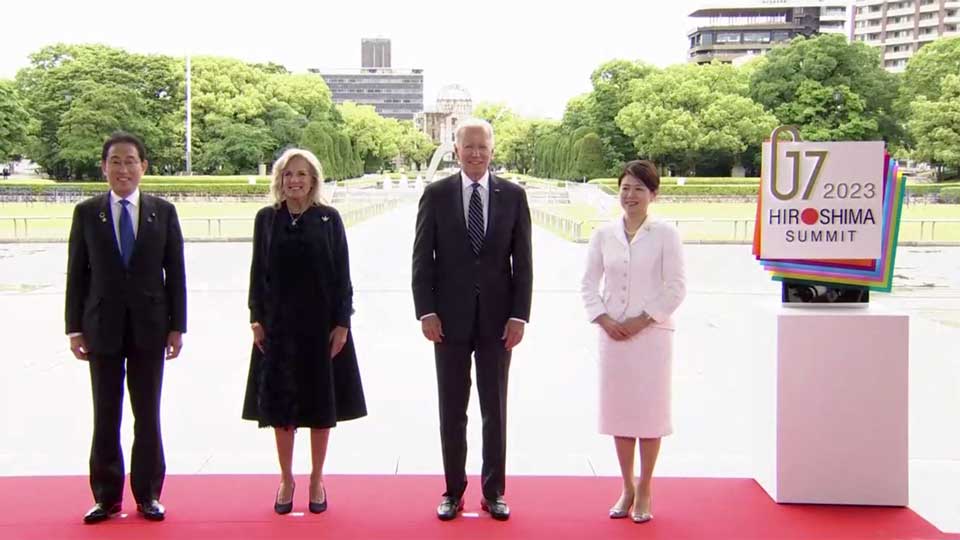
The last Group of Seven summit meeting to take place in Japan was held seven years ago.
The leaders are to visit the Peace Memorial Museum in the park of the same name. Inside are exhibits detailing the aftermath of the atomic bombing of the city.
They are also expected to meet with atomic bomb survivors, known as hibakusha.
The leaders will lay flowers at a cenotaph dedicated to victims of the bomb and offer prayers.
In the afternoon, they are scheduled to begin discussions at a hotel in the city.
A total of ten sessions will be held during the 3-day summit. To wrap up the talks, the leaders will issue a declaration highlighting the main points of their discussions.
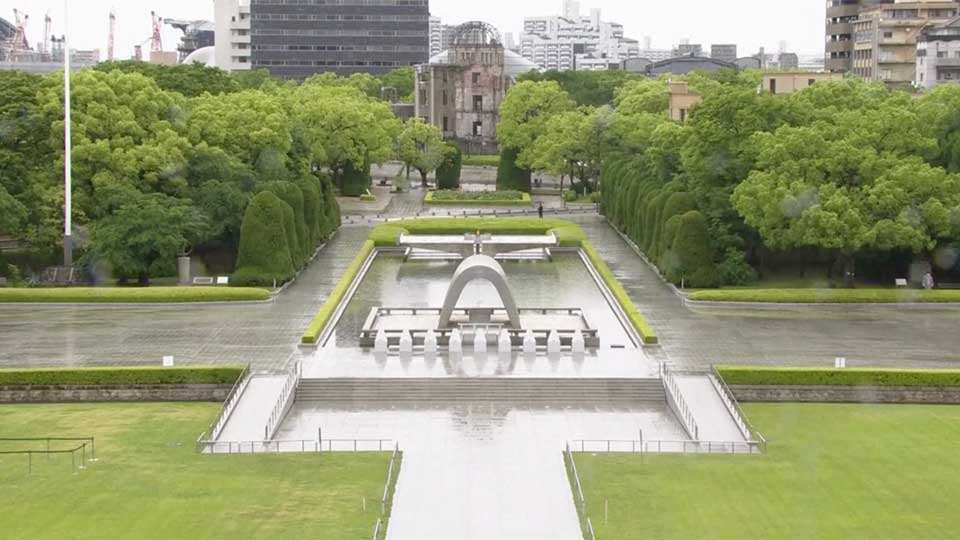
China's increasing assertiveness
China's expanding presence on the global stage is also expected to be among the leading items on the summit agenda.
The G7 countries have been calling on China to act responsibly as a member of the international community, amid increased assertiveness on the part of Beijing.
A joint statement issued by G7 foreign ministers after a gathering in Japan last month expressed serious concern over the situation in the East and South China seas and stressed the importance of peace and stability in the Taiwan Strait.
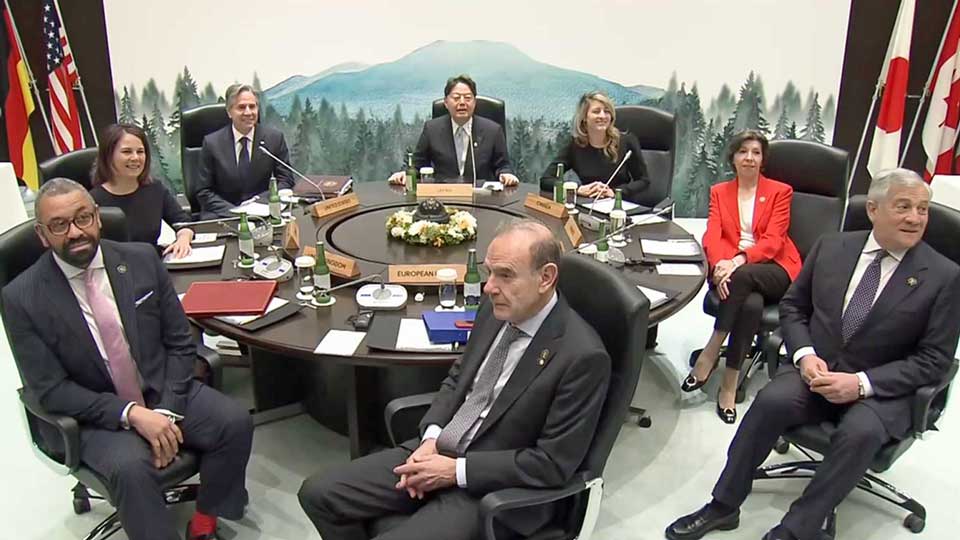
On the other hand, G7 member countries want to avoid a decisive confrontation, in part because of their economic ties with China. They are expected to share the view that they need to build a constructive and stable relationship through dialogue and work in cooperation with China on issues facing the international community.
The threat posed by North Korea
The G7 leaders are expected to exchange opinions on how to deal with North Korea, which is advancing its nuclear and missile development programs.
North Korea launched a record 37 ballistic missiles and other projectiles last year. The country has conducted 12 launches so far this year.
The G7 foreign ministers strongly condemned North Korea's repeated missile launches and their unprecedented frequency. They also agreed to be involved in the complete denuclearization of North Korea in line with UN Security Council resolutions.
Summit schedule Day 1: May19
On the morning of the first day, Prime Minister Kishida, together with his wife Yuko, will greet the leaders of the G7 countries and their partners at the Peace Memorial Park. The leaders will then visit the Hiroshima Peace Memorial Museum. Plans are also being finalized for the leaders to meet with A-bomb survivors at the museum.
In the afternoon, leaders will begin discussions at a working lunch. The theme is "a cooperative international society." They are expected to exchange views on the global economy, and the use of AI among other topics.
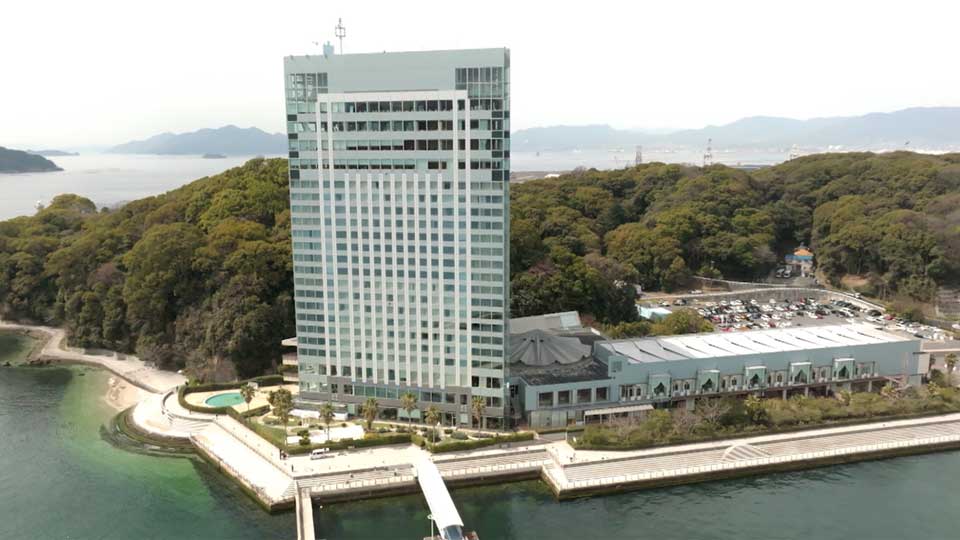
The theme of the next session is Ukraine. President Volodymyr Zelenskyy is scheduled to participate online. The leaders are expected to strongly condemn the Russian invasion, while confirming the policy of sanctions against Russia and continued support for Ukraine.
After the session, the leaders will move to Miyajima Island, home of the World Heritage Site Itsukushima Shrine, for a commemorative photo.
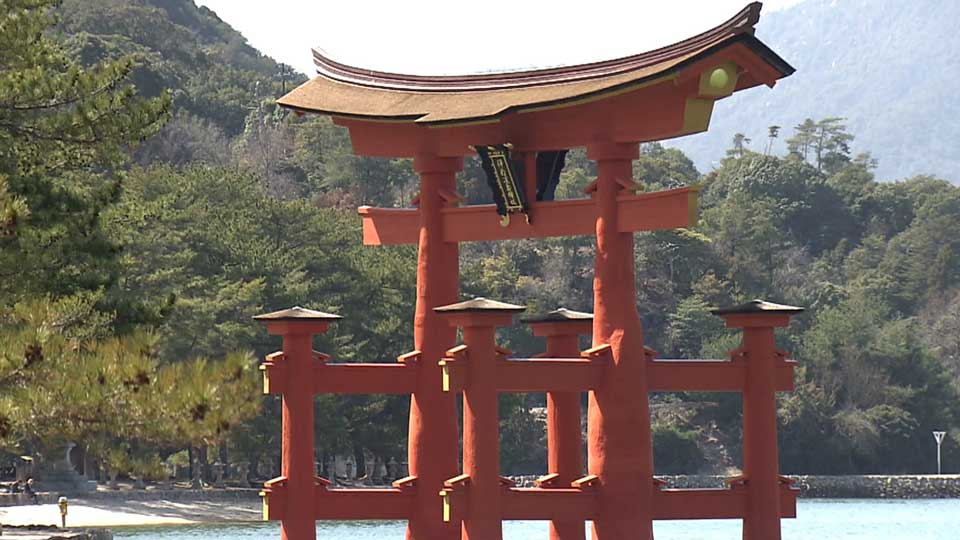
The leaders will then have a working dinner together. The theme is "diplomacy and security." The discussion will focus on the situation in the Indo-Pacific region, including China, as well as nuclear disarmament and non-proliferation.
Kishida, Biden confirm shared values of Japan-US alliance
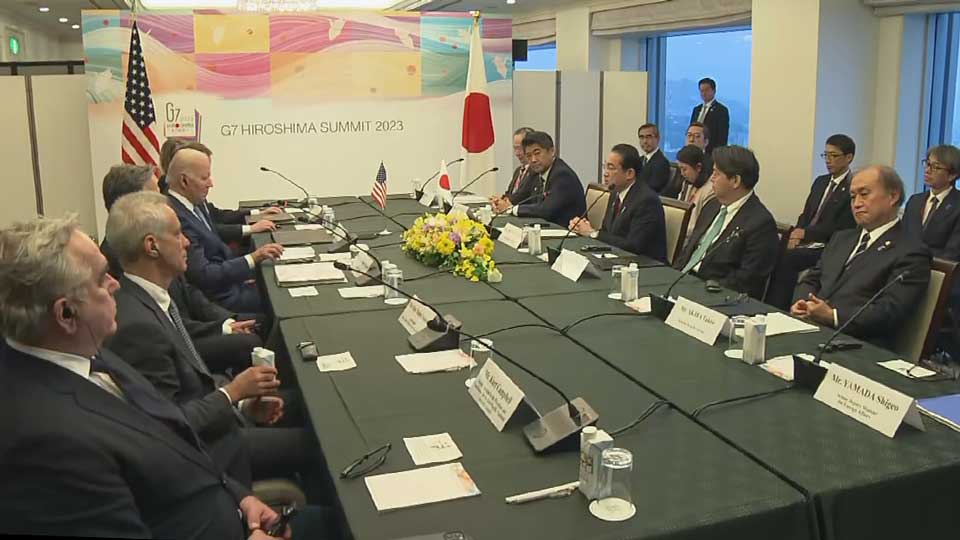
Japanese Prime Minister Kishida Fumio has met with US President Joe Biden ahead of the opening of the G7 Hiroshima Summit on Friday. It is believed they agreed to further strengthen the Japan-US alliance and to work together for the success of the summit.
The meeting lasted about one hour. At the opening photo session, Prime Minister Kishida told Biden he welcomed "the dramatic progress that has been made in Japan-US cooperation." He described the Japan-US alliance as "the cornerstone of peace and stability in the Indo-Pacific region."
On his goal for the summit, Kishida said he wanted to "demonstrate the G7's unwavering commitment to a free and open international order based on the rule of law."
US President Joe Biden said G7 leaders would be standing up for shared values at the summit. He said that included "supporting the brave people in Ukraine as they defend their sovereign territory and holding Russia accountable for its brutal aggression." He said the group would be "strengthening our community and our commitment to nuclear non-proliferation to ensure a free and open Indo-Pacific."
The details of the meeting are not yet known, but the two leaders are believed to have discussed the Japan-US alliance. It is thought they confirmed the further strengthening of deterrence and response capabilities.
The talks come at a time of growing tension in East Asia, fueled by China 's growing assertiveness and North Korea's repeated ballistic missile launches.
Japan-US talks begin
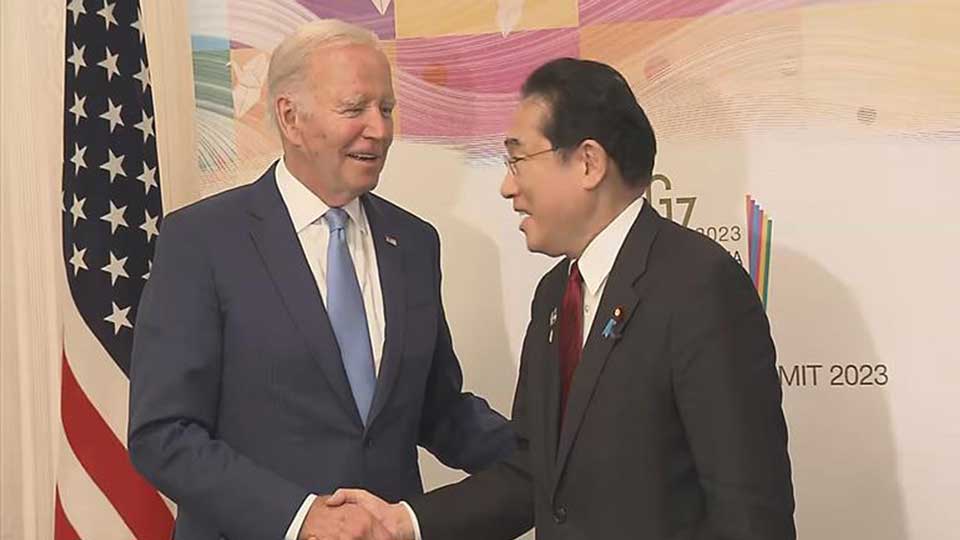
Discussions between Japanese Prime Minister Kishida and US President Joe Biden have started at a hotel in Hiroshima City.
The two leaders are expected to reaffirm the need to bolster deterrence and response capabilities of their countries' alliance in light of China's growing assertiveness and North Korea's repeated ballistic missile launches. They will also likely discuss ways to strengthen supply chains for important minerals and to advance negotiations on the Indo-Pacific Economic Framework.
(May 18 18:10 JST)
G7 leaders' summit schedule
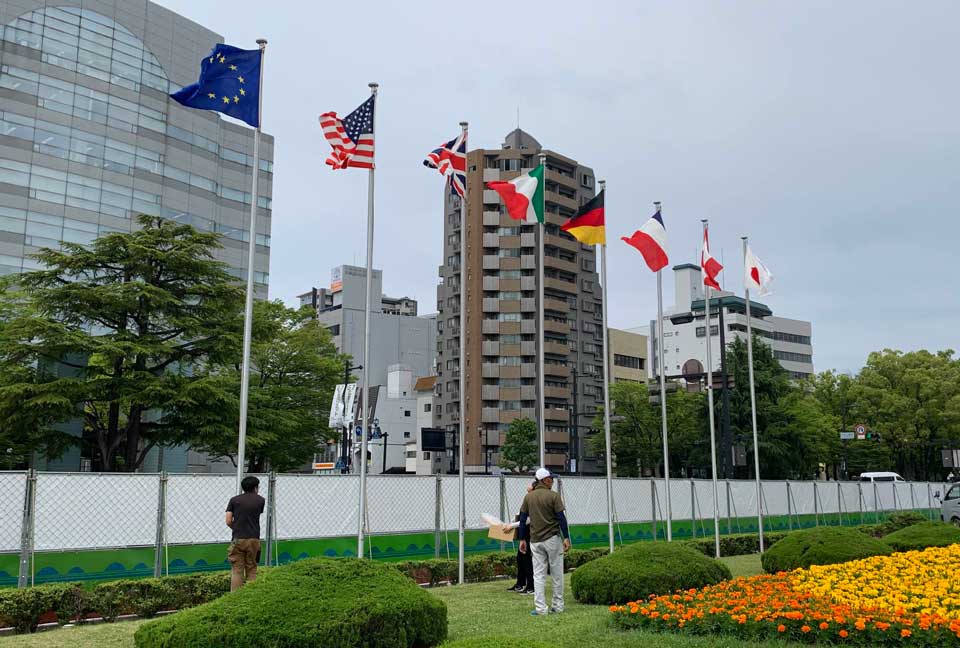
The G7 Hiroshima Summit will be held for three days, starting on Friday. In addition to discussions among themselves, G7 leaders will also have opportunities to exchange views at "outreach meetings" with invited countries and international organizations. The main schedule is as follows:
May 18: Day before the opening of the summit
Prime Minister Kishida Fumio arrived in Hiroshima around noon. He will hold a Japan-US summit meeting with US President Joe Biden in the afternoon. He will also hold separate meetings with British Prime Minister Rishi Sunak and Italian Prime Minister Giorgia Meloni.
May 20: Day 2
The theme of the morning session is "economic resilience and economic security." With China in mind, leaders are expected to discuss how to respond to "economic coercion" — the use of export restrictions and other measures to put pressure on countries. They will also likely examine cooperative measures to strengthen supply chains for semiconductors, critical minerals and other products.
The theme of the working lunch to follow is "strengthening engagement with partners." Leaders will discuss relations with emerging and developing countries. Many of these countries in the so-called "Global South" have taken a neutral stance on Ukraine and other issues.
In the afternoon of day two, leaders of eight invited countries, including India, Australia and South Korea, and representatives of seven international organizations will join the summit.
The invited countries and groups will then join a session called "Outreach Meeting." The theme is "responding to complex crises." Participants will look at global food problems, international health policies and gender issues.
The theme of the last session of day two is ”common efforts for a sustainable world." Leaders will exchange views on climate change, energy and environmental issues.
At the end of day two, participants and their partners will be invited to a social event.
May 21: Day 3
In the morning of the final day, the heads of the invited countries and international organizations will visit the Hiroshima Peace Memorial Museum. This will be followed by a session on the theme of "promoting a peaceful, stable and prosperous world."
G7 leaders will then hold a closing session among themselves. Afterwards, Prime Minister Kishida will explain the outcome of the discussions at a press conference.
On the sidelines of the summit, the leaders of Japan, US and South Korea will hold a meeting. A QUAD Summit, a framework of Japan, US, Australia and India, is also scheduled to be held on May 21.
(May 18 18:24 JST)
Kishida to meet Biden before G7 summit in Hiroshima
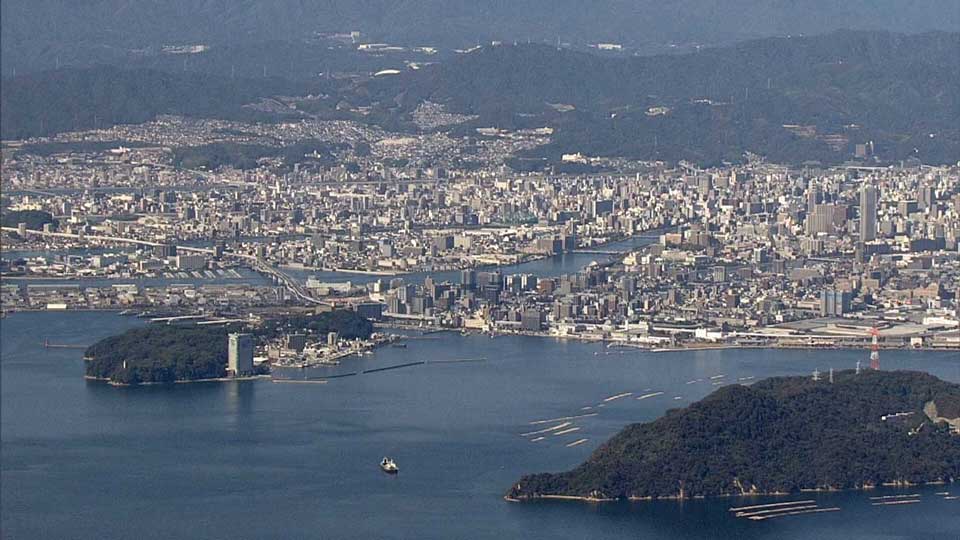
Japan's Prime Minister Kishida Fumio is scheduled to meet with US President Joe Biden in Hiroshima on Thursday ahead of the Group of Seven summit that starts Friday.
Kishida and Biden are expected to discuss the response capabilities of their countries' alliance amid growing concerns over China and North Korea.
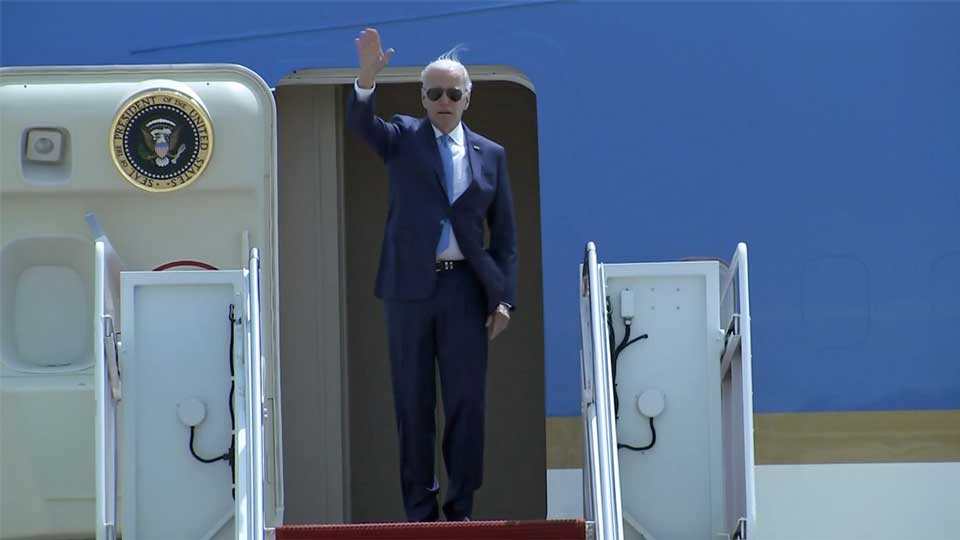
Biden to visit Peace Memorial Museum in Hiroshima
US National Security Advisor Jake Sullivan told reporters at the White House on Wednesday that the president will visit the Peace Memorial Museum with his G7 counterparts on Friday.
Sullivan said the president will not be making a statement. He explained that from Biden's perspective the visit is not a bilateral occasion.
He said, "This is him as one of the G7 leaders coming to pay respects."
(May 18 12:45 JST)

